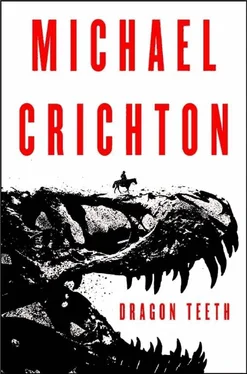The students, impatient for a taste of the “real West,” were delighted, and imagined that they, too, had become more real themselves.
But despite the fevered excitement, Johnson found the sight sad. In his journal he recorded, “The hopes of humanity for wealth and fame, or at least for creature comfort, can delude them so easily! For surely only a handful of the people here will find what they are seeking. And the rest will meet with disappointment, hardship, sickness, and perhaps death from starvation, Indians, or marauding robbers who prey on the hopeful, questing pioneers.”
And he added the ironic note: “I am most heartily glad that I am not going to the dangerous and uncertain Black Hills.”
Beyond Omaha the real West began, and aboard the train, everyone felt renewed excitement, tempered by the advice of older travelers. No, they would not see buffalo—in the seven years since the transcontinental rail lines opened, the buffalo had disappeared from view along the rail side, and indeed the legendary great herds of animals were fast disappearing altogether.
But then came the electrifying cry: “Indians!”
They ran to the opposite side of the car, pressed their faces to the glass. They saw three teepees in the distance, surrounded by a half dozen ponies and dark silhouetted figures, standing and watching the train go by. Then the Indians were gone, vanished behind a hill.
“What tribe are those?” Johnson asked. He was sitting next to Marsh’s assistant Gall.
“Pawnee, probably,” Gall said indifferently.
“Are they hostile?”
“Can be.”
Johnson thought of his mother. “Will we see more Indians?”
“Oh yes,” Gall said. “Lots of ’em where we’re going.”
“Really?”
“Yes, and probably riled up, too. There’s going to be a full-on Sioux War over the Black Hills.”
The federal government had signed a treaty with the Sioux in 1868, and as part of that treaty, the Dakota Sioux retained exclusive rights to the Black Hills, a landscape sacred to them. “That treaty was unnecessarily favorable to the Sioux,” Gall said. “The government even agreed to remove all forts and army outposts in the region.”
And it was a huge region, for in 1868, the Wyoming, Montana, and Dakota Territories still seemed distant and unapproachable wilderness. No one in Washington had understood how quickly the West would open up. Yet one year after the treaty had been signed, the transcontinental railroads began service, providing access in days to land that could previously be reached only by weeks of difficult overland travel.
Even so, the Sioux lands might have been respected had not Custer discovered gold during a routine survey in the Black Hills in 1874. News of gold fields, coming in the midst of a nationwide recession, was irresistible.
“Even in the best times, there’s no way to keep men from gold,” Gall said. “And that’s a plain fact.”
Although forbidden by the government, prospectors sneaked into the sacred Black Hills. The army mounted expeditions in ’74 and ’75 to chase them out, and the Sioux killed them whenever they found them. But still the prospectors came, in ever increasing numbers.
Believing the treaty had been broken, the Sioux went on the warpath. In May of 1876, the government ordered the army to quell the Sioux uprising.
“Then the Indians are in the right?” Johnson asked.
Gall shrugged. “You can’t stop progress, and that’s a plain fact.”
“We will be near the Black Hills?”
Gall nodded. “Near enough.”
Johnson’s understanding of geography, always vague, allowed his imagination free rein. He stared out at the wide-stretching plains, which seemed suddenly more desolate and unappealing.
“How often do Indians attack white people?”
“Well, they’re unpredictable,” Gall said. “Like wild animals, you never know what they’ll do, because they’re savages.”
West of Omaha the train climbed steadily and imperceptibly as it entered the high plains leading to the Rocky Mountains. They saw more animals now—prairie dogs, the occasional antelope, and coyotes loping in the distance near sunset. The towns became smaller, more desolate: Fremont, Kearney Junction, Alkali, Ogallala, Julesburg, and finally the notorious Sidney, where the conductor warned the students not to get off “if they valued their lives.”
Of course they all got off to look.
What they saw was a line of wooden storefronts, a town composed, wrote Johnson, “almost entirely of outfitters, stables, and saloons, and doing a brisk commerce in all three. Sidney was the town nearest to the Black Hills, and it was filled with emigrants, most of whom found prices outrageously high. The town’s reputation for murder and cut-throat life was not demonstrated to us, but then we had only stopped an hour.”
But they were not long disappointed, because the Union Pacific train was now speeding them westward to a still more notorious locus of vice and crime: Cheyenne, Wyoming Territory.
Travelers loaded their six-shooters coming into Cheyenne. And the conductor took Marsh aside to recommend that his party hire a guard, to see them safely through the town.
“Such preliminaries,” wrote Johnson, “gave us a most pleasurable nervous anticipation, for we imagined a lawless wild place which proved to be just that—a figment of our imaginations.”
Cheyenne turned out to be a rather orderly and settled place, with many brick buildings among those of wood-frame construction, but it was not entirely peaceful. Cheyenne boasted one schoolhouse, two theaters, five churches, and twenty gambling saloons. A contemporary observer wrote that “gambling in Cheyenne, far from being merely an amusement or recreation, rises to the dignity of a legitimate occupation—the pursuit of nine-tenths of the population, both permanent and transient.”
Gambling halls were open around the clock, and provided the major source of revenue to the town. Some indication of the business they did can be judged from the fact that the proprietors paid the city a license of $600 per year for each table, and each saloon had six to twelve green baize tables going at once.
The enthusiasm for gambling was not lost on the students, as they checked into the Inter-Ocean Hotel in Cheyenne, where Marsh had previously arranged a special rate. Although the best hotel in town, it was, noted Johnson, “a cockroach-infested dump, where the rats scurry up and down the walls, squeaking at all hours.” Nevertheless, each student was given a private room, and after soaking in hot baths, they were ready for a night on the town.
Timid, they set forth as a group—twelve earnest young down-Easters, still wearing their high collars and bowler hats, strolling from saloon to saloon with as much nonchalance as they could muster. For the town, which had appeared disappointingly tame by day, assumed a positively sinister aspect at night.
In the yellow light of the saloon windows, the boardwalk crowd of cowboys, gunmen, gamblers, and cutthroats looked at them with amusement. “These varmints’d kill you as soon as smile at you,” said one student melodramatically. Feeling the unfamiliar weight of their new Smith & Wesson revolvers dragging at their hips, the students tugged at their guns, adjusting their weight.
One man stopped them. “You look like nice fellers,” he told the group. “Take some friendly advice. In Cheyenne, don’t touch your guns ’less you mean to use ’em. Round here, people don’t look at your face, they look at your hands, and a great deal of drinking is done in these precincts at night.”
Читать дальше









